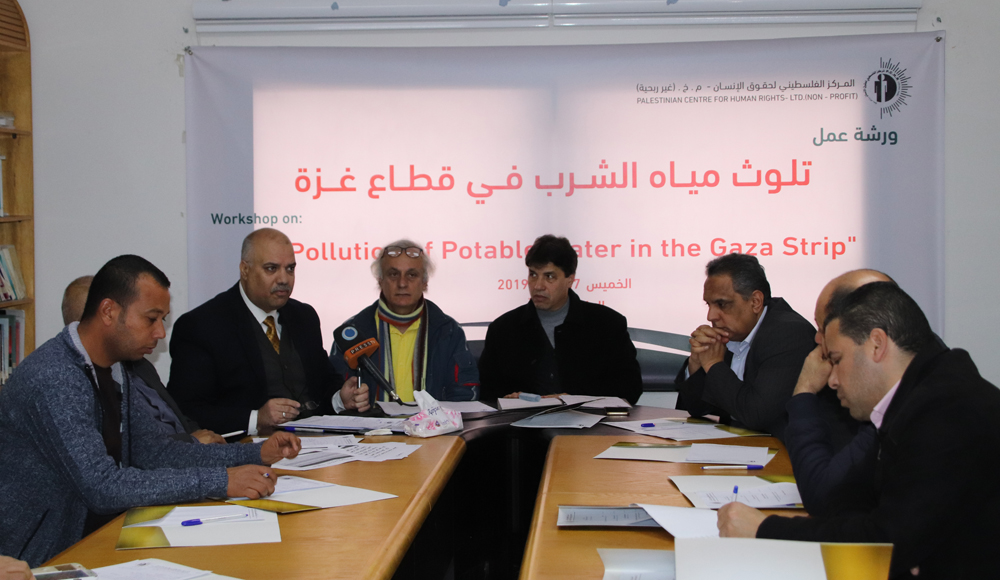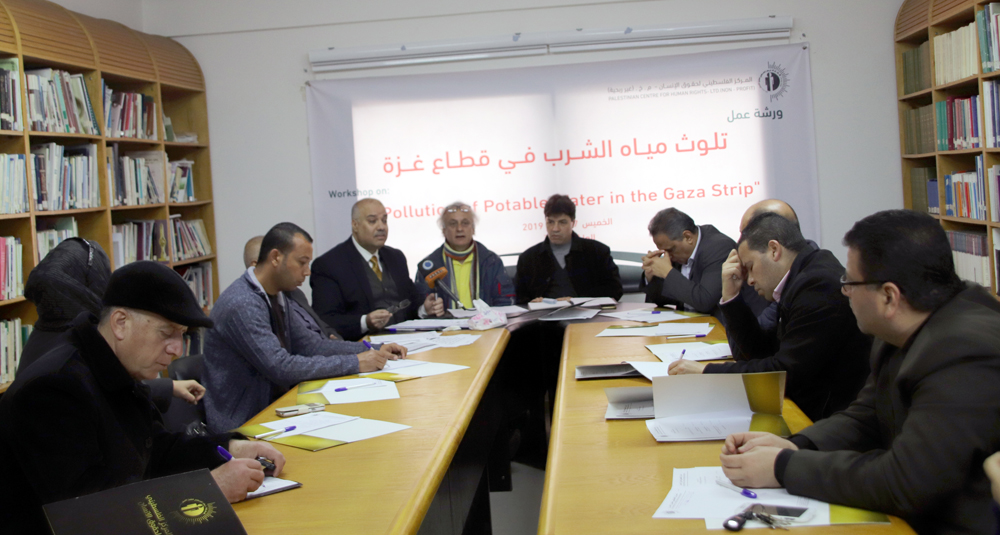
On Thursday, 07 February 2019, the Palestinian Center for Human Rights (PCHR) organized a workshop titled as “Drinking Water Pollution in the Gaza Strip.” The workshop discussed the reality of drinking water in the Gaza Strip from a human rights perspective and repercussions of water pollution on the public health in the Gaza Strip. The workshop was attended by experts representing the Water Authority, Coastal Municipalities Water Utility (CMWU), Ministry of Health, academics, civil society organizations, and media.
Khalil Shahin, Head of the Social and Economic Rights Unit, opened the workshop and reviewed PCHR’s role in following and shedding light on the social and economic situation and the various crises which the Gaza residents suffer from in light of the Israeli closure and internal political division. Shahin said that the drinking water pollution has catastrophic and serious reflections on civilians’ health that shall be faced by the official and private organizations operating in the water sector through enhancing the monitoring mechanisms to guarantee civilians’ access to safe and clean drinking water. He added that this to achieve the sixth goal of the 2030 Sustainable Development Goals which ensures availability and sustainable management of water and sanitation for all and within the framework of enhancing and protecting civilians’ right to water as a fundamental human right.
 In his intervention, Engineer Monther Shublaq, CMWU Director General, displayed the reality of water in the Gaza Strip as he confirmed that around 97% of the Gaza Strip water is unsuitable for domestic use, requiring alternative solutions that would guarantee civilians’ access to water suitable for human use, including tightening control over the sold drinking water. Shublaq pointed out that absence of political stability in the Gaza Strip negatively reflects on the water and sanitation conditions regarding funding and residential care. Shublaq added that the work is ongoing to overcome the current water crisis in the Gaza Strip through establishing 3 desalination plants that are expected to operate by the end of 201 and will yield 40,000 cubic meters water of high quality out of 165,000 cubic meters which the CMWU yields and supplies the Gaza Strip.
In his intervention, Engineer Monther Shublaq, CMWU Director General, displayed the reality of water in the Gaza Strip as he confirmed that around 97% of the Gaza Strip water is unsuitable for domestic use, requiring alternative solutions that would guarantee civilians’ access to water suitable for human use, including tightening control over the sold drinking water. Shublaq pointed out that absence of political stability in the Gaza Strip negatively reflects on the water and sanitation conditions regarding funding and residential care. Shublaq added that the work is ongoing to overcome the current water crisis in the Gaza Strip through establishing 3 desalination plants that are expected to operate by the end of 201 and will yield 40,000 cubic meters water of high quality out of 165,000 cubic meters which the CMWU yields and supplies the Gaza Strip.
Engineer Mazen al-Bana, Deputy Head of the Water Authority, reviewed the challenges facing the water sector which are the salty water that is unsuitable for human use resulting from non-treatment of sewage water, leakage into the underground reservoir and the Gaza Strip resident’s mainly depending on septic holes, indicating the limited sources of water in light of the high population density in the Gaza Strip. Al-Banna called for finding urgent solutions to save the water sector in
the Gaza Strip, mainly through the serious coordination between the water sectors in the Gaza Strip and West Bank, and strengthening the international support for establishing projects relevant to the water sector. He said that the solution to decrease the aggravating water crisis is establishing desalination plants along with water sewage treatment plants to guarantee the non-leakage of sewage water into the underground reservoir.
Engineer Khaled al-Tibi, Head of Water Control Department in the Ministry of Health, said that the deterioration of the water situation in the Gaza Strip in 2018 was the worst regarding the polluted drinking water, indicating that the Ministry of Health and via its specialized departments in the Gaza Strip formed technical committees to control and follow the water sources. Al-Tibi said that despite all efforts by the ministry to alleviate the water crisis, the challenges facing the Ministry are way beyond its capabilities, particularly after the biological contamination of the water reached 28% in the private desalination plants that would affect people’s life, particularly children, and cause them many diseases.
The workshop concluded with inquires and interventions by the participants and recommended the following: